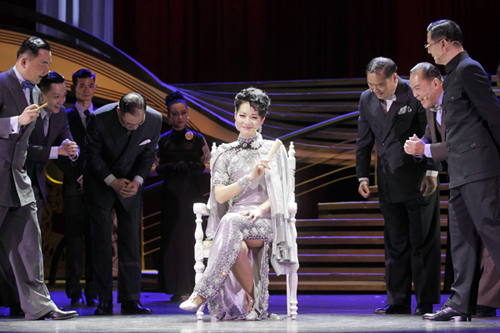
The Eternal Snow Beauty, adapted from Taiwan writer Pai Hsien-yung's novel, is about a Shanghai belle in the 1940s. Photos provided to China Daily
Shanghai theater critics have lauded the premiere of The Eternal Snow Beauty, praising it for reviving the tradition of Shanghai dialect theater.
The Eternal Snow Beauty tells the story of a glamorous woman in a 1940s Shanghai dance hall. It is presented mainly in the Shanghai dialect, but there are also colloquial expressions from Suzhou, Ningbo, Yangzhou and pidgin English.
The colorful language evokes the time when Shanghai was an open harbor and a melting pot of different cultures, says Zhu Guang, a critic with Xinmin Evening News.
Zhu says the production is a milestone in the city's theater scene. Traditional Shanghai dialect theater was dormant in the 1940s, and The Eternal Snow Beauty has brought it back to contemporary theater.
The Eternal Snow Beauty was originally a short story by Taiwan-based writer Pai Hsien-yung from his book Taipei People, a collection of stories he wrote in the 1960s.
The play tells the story of Yin Hsueh-yen, once the belle of Shanghai's Paramount ballroom. In the late 1940s, before the fall of the Kuomintang and their flight to Taiwan, she is surrounded by admirers - high-ranking officials and rich businessmen.
Twenty years later Yin hosts an upscale mahjong gathering in her Taipei home, still the center of attention many years later.
Many of Pai's works have been adapted for the theater or screen, some repeatedly. The Eternal Snow Beauty however, is being staged for the first time.
"Forty years ago, when I wrote the story of Yin Hsueh-yen, I never expected she would come back to Shanghai ever again," Pai says at the play's premiere at Shanghai Culture Square on May 4.
The play's first run, from May 4 to 16, sold out. It will tour Beijing, Hong Kong and Taiwan. "It's definitely not meant for the Yangtze Delta market only," says Xu Jun, director of the play.
